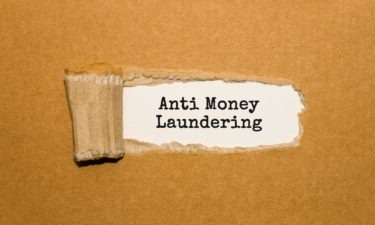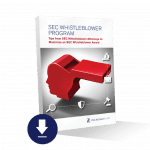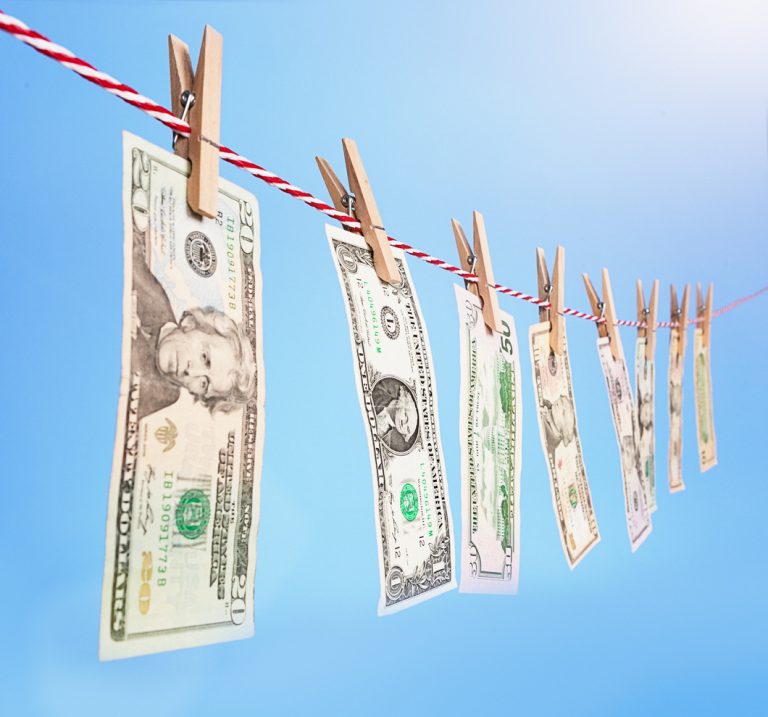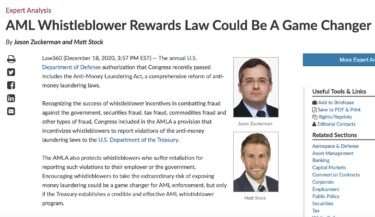Whistleblower Rewards for Reporting Money Laundering
 The Anti-Money Laundering Act of 2020 incentivizes whistleblowers to report violations of the anti-money laundering laws to the Department of the Treasury’s Financial Crimes Enforcement Network (FinCEN). The AMLA requires FinCEN to pay an award of up to 30 percent of collected monetary sanctions that it recovers in a judicial or administrative action brought under the Bank Secrecy Act that results in sanctions exceeding $1,000,000.
The Anti-Money Laundering Act of 2020 incentivizes whistleblowers to report violations of the anti-money laundering laws to the Department of the Treasury’s Financial Crimes Enforcement Network (FinCEN). The AMLA requires FinCEN to pay an award of up to 30 percent of collected monetary sanctions that it recovers in a judicial or administrative action brought under the Bank Secrecy Act that results in sanctions exceeding $1,000,000.
The SEC can also pay awards to whistleblowers for disclosing a broker-dealer’s failure to file suspicious activity reports, maintain an anti-money laundering compliance program, or establish an adequate customer identification program. In addition, the SEC can take an enforcement action against a mutual fund for a violation of Rule 38a-1, which requires investment companies to adopt and implement written policies and procedures reasonably designed to prevent violations of the federal securities laws by the funds, which includes the Bank Secrecy Act.
Contact the experienced AML whistleblower lawyers at Zuckerman Law for a free, confidential consultation. The law firm’s SEC whistleblower attorneys will work to quickly provide SEC whistleblowers with the highest-quality representation.
Click here or call us today at 202-262-8959.






Anti-Money Laundering Enforcement
 Fines for money laundering violations can be substantial. In December 2022, Danske Bank agreed to pay $413 million to settle charges that it violated the antifraud provisions of the Securities Exchange Act of 1934 by misleading investors about its AML compliance program in its Estonian branch and failing to disclose the risks posed by the program’s significant deficiencies. Danske Bank has agreed to pay more than $2 billion as part of an integrated, global resolution with the SEC, the Department of Justice, the United States Attorney’s Office for the Southern District of New York, and Denmark’s Special Crime Unit.
Fines for money laundering violations can be substantial. In December 2022, Danske Bank agreed to pay $413 million to settle charges that it violated the antifraud provisions of the Securities Exchange Act of 1934 by misleading investors about its AML compliance program in its Estonian branch and failing to disclose the risks posed by the program’s significant deficiencies. Danske Bank has agreed to pay more than $2 billion as part of an integrated, global resolution with the SEC, the Department of Justice, the United States Attorney’s Office for the Southern District of New York, and Denmark’s Special Crime Unit.
And in February 2018, U.S. Bancorp/U.S. Bank paid $613 million in fines and forfeitures to settle charges that it failed to maintain adequate safeguards against money laundering. In particular, U.S. Bancorp/U.S. Bank limited the number of transactions its systems would flag as suspicious and processed Western Union transactions for non-customers.
SEC and FINRA Continue to Prioritize Anti-Money Laundering Compliance
The SEC’s 2024 examination priorities clarify that the SEC continues to focus on AML compliance:
The BSA requires certain financial institutions, including broker-dealers and certain registered investment companies, to establish anti-money laundering (AML) programs that are tailored to address the risks associated with the firm’s location, size, and activities, including the customers they serve, the types of products and services offered, and how those products and services are offered. These programs must, among other things, include policies, procedures, and internal controls reasonably designed to achieve compliance with the BSA and its implementing rules; independent testing; and risk-based procedures to perform customer due diligence (as required by the Customer Due Diligence rule), which includes identifying and verifying the identity of customers and conducting ongoing monitoring to identify and report suspicious transactions. Where appropriate, certain financial institutions must also file Suspicious Activity Reports (SARs) with the Financial Crimes Enforcement Network. SARs can be used to detect and combat market manipulation, insider trading, Ponzi schemes, corruption, money laundering, terrorist financing, and a variety of other illicit activities potentially violative of securities and other laws and regulations.
The Division will continue to focus on AML programs to review whether broker-dealers and certain registered investment companies are: (1) appropriately tailoring their AML program to their business model and associated AML risks; (2) conducting independent testing; (3) establishing an adequate customer identification program, including for beneficial owners of legal entity customers; and (4) meeting their SAR filing obligations.
Examinations of certain registered investment companies will also review policies and procedures for oversight of applicable financial intermediaries. Also, the Division will review whether broker-dealers and advisers are monitoring Office of Foreign Assets Control sanctions and ensuring compliance with such sanctions.
Broker-Dealer Anti-Money Laundering Requirements
The primary anti-money laundering regulations for brokers or dealers require, among other things, the establishment and implementation of an anti-money laundering program, which includes, at a minimum:
- Policies, procedures, and internal controls reasonably designed to achieve compliance;
- Independent testing for compliance;
- Monitoring of the operations and internal controls of the program;
- Ongoing training for appropriate persons; and
- Appropriate risk-based procedures for conducting ongoing customer due diligence, which includes:
- Establishing, documenting, and maintaining a written Customer Identification Program; and
- Continuous monitoring to identify and report suspicious transactions.
In the event that a broker-dealer identifies a suspicious transaction, the firm is required to file a SAR with the U.S. Treasury Department’s Financial Crimes Enforcement Network (FinCEN). In the SAR’s narrative section, broker-dealers must “[p]rovide a clear, complete and chronological description . . . of the activity, including what is unusual, irregular or suspicious about the transactions(s).” Broker-dealers violate federal securities laws (specifically, Section 17(a) of the Exchange Act and Rule 17a-8) when they:
- Fail to file SARs; or
- File inaccurate SARs (e.g., incomplete narratives, incomplete critical field information, incomplete identification of suspicious activity, etc.).
These violations deprive regulators and law enforcement of important information that could be used to identify potential securities law and money laundering violations.
SEC and FINRA AML Enforcement Actions
- In September 2023, the SEC iharged registered investment adviser DWS Investment Management Americas Inc. (DIMA or DWS), a subsidiary of Deutsche Bank AG, for its failure to develop a mutual fund Anti-Money Laundering program. To settle the charges, DIMA agreed to pay a total of $25 million in penalties. The SEC’s order also found that DIMA caused such mutual funds’ failure to adopt and implement policies and procedures reasonably designed to detect activities indicative of money laundering and to conduct AML training specific to the mutual funds’ business.
- In September 2023, the SEC charged a registered representative at a registered broker-dealer with failing to report suspicious and unusual transactions in a brokerage account of his long-time customer to the AML group of the brokerage firm where he worked, which caused the firm to fail to timely file a SAR in violation of the federal securities laws.
- In May 2016, FINRA fined Raymond James & Associates and Raymond James Financial Services $17 million for widespread violations related to their anti-money laundering programs. The violations stemmed from the firms’ failure to establish and implement adequate anti-money laundering programs, which in turn precluded the firms from meeting their duty to prevent, detect, investigate, and report suspicious activity from at least November 2011 through June 2014.
- In December 2016, FINRA fined Credit Suisse Securities (USA) LLC $16.5 million for “significant deficiencies” in its anti-money laundering program. According to FINRA, Credit Suisse’s program failed to effectively monitor/detect suspicious trading and money movements from at least January 2011 through December 2015. As a result, Credit Suisse was unable to determine whether to file required SARs.
- In January 2015, Oppenheimer & Company paid $10 million to settle an action by the SEC and FinCEN for failure to file SARs. According to the SEC’s complaint, Oppenheimer’s anti-money laundering program identified suspicious activity that needed to be “escalated” immediately. Specifically, the activity stemmed from an account that: “(i) was a foreign broker-dealer doing business in the U.S.; (ii) selling ‘low-priced stock’ on behalf of customers; and (iii) that it immediately wired the proceeds out of the Oppenheimer account.” Despite these and other red flags, Oppenheimer failed to file SARs with FinCEN.
- In February 2016, the SEC fined E.S. Financial Services $1 million for violating anti-money laundering laws by “allowing foreign entities to buy and sell securities without verifying the identities of the non-U.S. citizens who beneficially owned them.” As mentioned, federal securities laws require broker-dealers to establish, document, and maintain a written Customer Identification Program.
SEC AML Enforcement
In a July 2023 Risk Alert, EXAMS staff observed certain weaknesses in OFAC compliance programs, including instances in which entities did not adopt or implement reasonable, risk-based internal controls for
- following-up on potential matches with the sanctions lists and documenting the outcome of such follow-up;
- performing periodic or event-based screening of existing clients or customers based on, among other
things, changes in ownership or to the sanctions lists; and - conducting OFAC searches in a timely manner (or documenting that such searches were
completed).
The alert encourages registrants to review and strengthen the policies, procedures, and internal controls of their AML programs to further their compliance with federal AML rules and regulations, and to monitor for amendments, pursuant to
the AMLA and the Corporate Transparency Act.
Anti-Money Laundering (AML) Whistleblower Lawyers’ Guide to AMLA Whistleblower Rewards Law
Guide to Anti-Money Laundering Act Whistleblower Rewards and ProtectionsSEC Takes Aim at Broker-Dealers for Anti-Money Laundering Violations

On June 5, 2017, the SEC charged brokerage firm Alpine Securities Corporation (Alpine) with securities law violations related to its ineffective anti-money laundering program. According to the SEC’s complaint, Alpine failed to adequately file suspicious activity reports (SARs) for at least 1,950 stock transactions that the firm flagged as suspicious. The SEC found that Alpine’s “records contained information reflecting material red flags of money laundering, securities fraud, or other illicit financial activities relating to its customers and their transactions,” and that Alpine “routinely and systematically failed to identify and report suspicious activity in its SAR filings.”
The SEC charged Alpine with thousands of violations of Section 17(a) of the Exchange Act and Rule 17a-8, and sought an order requiring Alpine to pay civil money penalties pursuant to Section 21(d) of the Exchange Act, which provides for penalties ranging from $5,000 to $500,000 for each violation The SEC’s complaint reveals that the SEC also charged many of Alpine’s customers with federal securities laws violations, including violations relating to transactions that cleared through Alpine.
SEC Whistleblower Program Pays More than $1.8 Billion in Awards to Whistleblowers
 In 2010, Congress created the SEC Whistleblower Program to “motivate those with inside knowledge to come forward and assist the Government to identify and prosecute persons who have violated securities laws and recover money for victims of financial fraud,” S. Rep. No. 111-176, at 110 (2010).
In 2010, Congress created the SEC Whistleblower Program to “motivate those with inside knowledge to come forward and assist the Government to identify and prosecute persons who have violated securities laws and recover money for victims of financial fraud,” S. Rep. No. 111-176, at 110 (2010).
The SEC Whistleblower Program has enabled the SEC to uncover significant investment fraud schemes and halt ongoing fraud. The SEC has paid more than $1.8 billion in awards to whistleblowers for providing information that led to successful enforcement actions.
AML Whistleblower Attorneys’ Expert Analysis About AML Whistleblower Reward Program
AML Whistleblower Attorneys: Tier 1 Firm
The experienced AML whistleblower lawyers at Zuckerman Law represent whistleblowers worldwide before the SEC under the Dodd-Frank SEC Whistleblower Program. The firm has a licensed Certified Public Accountant and Certified Fraud Examiner on staff to enhance its ability to investigate and disclose complex financial fraud to the SEC.
Firm Principal Jason Zuckerman has been named by Washingtonian Magazine as a “Top Whistleblower Lawyer” and the firm has been ranked by U.S. News as a Tier 1 Firm in Labor & Employment Litigation.
- See our column in Forbes: One Billion Reasons Why The SEC Whistleblower-Reward Program Is Effective
- See our column in Going Concern: Sarbanes-Oxley 15 Years Later: Accountants Need to Speak Up Now More Than Ever
- See our post in Accounting Today: Whistleblower Protections and Incentives for Auditors and Accountants.
- See our article providing Tips for SEC Whistleblowers
Leading whistleblower law firm Zuckerman Law has substantial experience investigating securities fraud schemes and preparing effective submissions to the SEC concerning a wide range of federal securities violations, including:
- Accounting fraud;
- Investment and securities fraud;
- EB-5 investment fraud;
- Manipulation of a security’s price or volume;
- Fraudulent securities offerings and Ponzi schemes;
- Unregistered securities offerings;
- Investment adviser fraud;
- False or misleading statements about a company or investment;
- Inadequate internal controls; and
- Violations of auditor independence rules.
For more information about the SEC Whistleblower Program, download our free ebook SEC Whistleblower Program: Tips from SEC Whistleblower Attorneys to Maximize an SEC Whistleblower Award and see the following resources:
Process for Seeking an AML SEC Whistleblower Award
- Tips for SEC Whistleblowers
- Leading SEC Whistleblower Law Firm Featured in Article About Growing Wave of Whistleblower Lawsuits
- SEC Whistleblower Reward Program FAQ
- Auditors’ and accountants’ guide to SEC whistleblower awards
- Whistleblower Protections and Incentives for Auditors and Accountants
- How to Report EB-5 Fraud and Earn an SEC Whistleblower Award
- CFTC Strengthens Anti-Retaliation Protections for Whistleblowers and Improves CFTC Whistleblower Award Program
- SEC Cracking Down on Ponzi Schemes
- SEC Scrutinizes “Fake News” Stock Promotion Schemes
- SEC Whistleblower Program: Exposing Insider Trading
- SEC Awards for Disclosures of Foreign Bribery or FCPA Violations
- Whistleblower Rewards and Bounties for Disclosures of Market Manipulation Schemes
- SEC Targeting Investment Adviser Fraud
- Compliance Personnel, Auditors, Officers and Directors Can Obtain SEC Whistleblower Awards
- Money Laundering and the SEC Whistleblower Program
- International Whistleblower Representation – SEC Whistleblower Attorney
- Anonymous Whistleblowing: Does the SEC Whistleblower Program Protect a Whistleblower’s Identity?
- SEC Awards for Disclosures of Foreign Bribery or FCPA Violations
- Securities Fraud Enforcement Action Prompts the Question: What Was the Company Smoking?
- Compliance Officer Whistleblower Representation
- SEC Whistleblower Program: What is the SEC Form TCR?
- Tale of Two Whistleblowers: Lessons Learned from Today’s SEC Whistleblower Award
- Whistleblowers Help CFTC Obtain Record Penalties for Commodities Fraud
- Report Underscores Importance of Whistleblower Rewards and Protections for Internal Auditors
- SEC Sanctions: Whistleblower Reference Guide
- Protections and Rewards for Cybersecurity Whistleblowers
- CFTC Announces Second Whistleblower Award in 2016 as the Agency’s Whistleblower Reward Program Picks Up Steam
- EB-5 Visa Scandal Underscores the Critical Role Whistleblowers Play in Exposing EB-5 Fraud
- SEC Enforcement Director Touts Success of SEC Whistleblower Program
- SEC Whistleblower Program Not Limited to Corporate Insiders
- SEC Pays $3M Award to Whistleblower
- SEC Draft Strategic Plan Affirms the Importance of the SEC’s Whistleblower Reward Program
- Whistleblower Lawyer Interviewed About SEC Whistleblower Award
- Wall Street Journal Quotes Jason Zuckerman on Dodd-Frank SEC Regulations
- SEC Whistleblower Lawyer Quoted in National Law Journal About SEC Whistleblower Program
- SEC Whistleblower Lawyer Zuckerman Quoted About SEC Whistleblower Award for Independent Analysis
- SEC Whistleblower Lawyer Jason Zuckerman Quoted About Tips for SEC Whistleblowers
- Whistleblower Lawyer Jason Zuckerman Quoted About SEC Whistleblower Award
- Whistleblower Lawyer Interviewed About the Rise of Cybersecurity Whistleblowing
- Whistleblower Attorney Zuckerman Quoted in Washington Post About SEC Order
- Whistleblower Attorney Dallas Hammer Interviewed by Bloomberg About Dodd-Frank Protected Whistleblowing
- SEC Whistleblower Lawyer Zuckerman Quoted About SEC Whistleblower Award for Independent Analysis
- Audit committees need to dig into personal relationships
- Whistleblower Bounties Pose Challenges
- CFO Magazine Quotes Whistleblower Attorney Jason Zuckerman About Dodd-Frank Whistleblower Rules
- Fiscal Times Quotes Jason Zuckerman About Dodd-Frank Act Whistleblower Reward Provisions
- Whistleblower Attorney Jason Zuckerman Quoted About Battle Over Corporate Whistleblower Rules
In 2020, the SEC announced that “Anti-Money Laundering” was on the agency’s List of Examination Priorities. The SEC’s examination priorities “reflect certain practices, products, and services that [SEC’s Office of Compliance Inspections and Examinations] perceives to present potentially heightened risk to investors and/or the integrity of the U.S. capital markets.” In the priority list, the SEC clarifies that it will continue to scrutinize broker-dealers’ anti-money laundering programs by:
- Examining the appropriateness and effectiveness of broker-dealers’ anti-money laundering programs;
- Reviewing how broker-dealers are monitoring for suspicious activity; and
- Assessing broker-dealers’ compliance with SAR requirements.
In 2016, the SEC announced that it would share more of its oversight responsibilities of the broker-dealer industry with the Financial Industry Regulatory Authority (FINRA). Since 2017, and in lockstep with the SEC, FINRA included “Anti-Money Laundering and Suspicious Activity Monitoring” on its 2020 Annual Regulatory and Examination Priorities Letter. Both the SEC and FINRA have increased enforcement actions against broker-dealers for anti-money laundering program violations.
The Bank Secrecy Act (“BSA”), and implementing regulations promulgated by the Financial Crimes Enforcement Network (“FinCEN”) require that broker-dealers file SARs with FinCEN to report a transaction (or a pattern of transactions of which the transaction is a part) conducted or attempted by, at, or through the broker-dealer involving or aggregating to at least
$5,000 that the broker-dealer knows, suspects, or has reason to suspect: (1) involves funds derived from illegal activity or is conducted to disguise funds derived from illegal activities; (2) is designed to evade any requirement of the BSA; (3) has no business or apparent lawful purpose or is not the sort in which the particular customer would normally be expected to engage, and the broker-dealer knows of no reasonable explanation for the transaction after examining the available facts; or (4) involves use of the broker-dealer to facilitate criminal activity. Broker-dealers are required to file the SAR 30 calendar days after the date of the initial detection of facts that may constitute a basis for filing a SAR under the SAR Rule. 31 C.F.R. § 1023.320(b)(3). In cases where the broker-dealer cannot identify a suspect, it must file the SAR within 60 days of the initial detection of facts that may constitute a basis for filing a SAR.
The Bank Secrecy Act (“BSA”), and implementing regulations promulgated by the Financial Crimes Enforcement Network (“FinCEN”), require that broker-dealers file SARs with FinCEN to report a transaction (or a pattern of transactions of which the transaction is a part) conducted or attempted by, at, or through the broker-dealer involving or aggregating to at least $5,000 that the broker-dealer knows, suspects, or has reason to suspect: (1) involves funds derived from illegal activity or is conducted to disguise funds derived from illegal activities; (2) is designed to evade any requirement of the BSA; (3) has no business or apparent lawful purpose or is not the sort in which the particular customer would normally be expected to engage, and the broker-dealer knows of no reasonable explanation for the transaction after examining the available facts; or (4) involves use of the broker-dealer to facilitate criminal activity. 31 C.F.R. § 1023.320(a)(2) (the “SAR Rule”). Broker-dealers are required to file the SAR 30 calendar days after the date of the initial detection of facts that may constitute a basis for filing a SAR under the SAR Rule. 31 C.F.R. § 1023.320(b)(3). In cases where the broker-dealer cannot identify a suspect, it must file the SAR within 60 days of the initial detection of facts that may constitute a basis for filing a SAR.
Id.
Exchange Act Rule 17a-8 requires broker-dealers registered with the Commission to comply with the reporting, record-keeping, and record retention requirements of the BSA. The failure to timely file a SAR as required by the SAR Rule is a violation of Section 17(a) of the Exchange Act.




